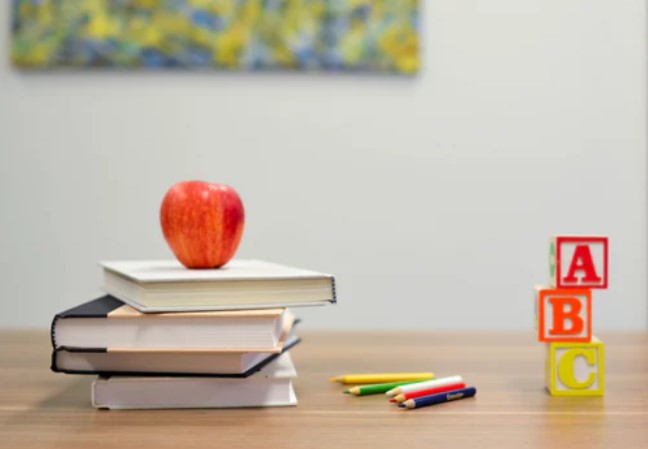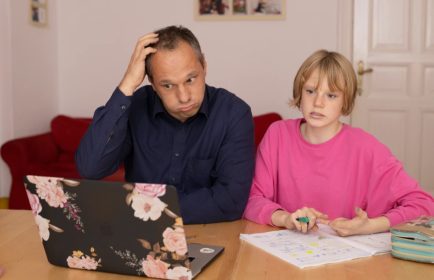You’ve probably got two big hopes for your child as she starts school. You want her to be happy and you want her to do well. The trick is to remember that the two are linked. Your child won’t flourish if she isn’t settled. Getting off to a good start in reception will help to ensure she’s able to make the most of her school years.
What should I do in the first weeks of school?
Try to get into good habits when your child starts school. She won’t do well if she’s tired, so plenty of sleep is important. Get her up in good time so she doesn’t have to worry about being late. A good breakfast will help your child to concentrate. So if she’s a picky eater tempt her with something she likes.
Your child will be starting to learn to read and write, if she hasn’t already. Young children soak up language so help her by talking to her, praising her and reading her a bedtime story. Ask her questions that need more than a yes or no answer. If you both like singing, then sing.
Your child will also be learning more about numbers, so you can help by making up number games. Perhaps when you’re out together you can look at all the numbers around you. Shops are good places for this. If you’re at home, you can count toys, play with the kitchen scales, or splash about with water and measuring jugs.
Remember that your child still needs to learn through play. Starting school shouldn’t mean she is under pressure to achieve. She needs to enjoy herself and to be praised, particularly if she has tried hard at something. If you feel that she is getting anxious, talk to her teacher.
What if my child can’t sit still?
Perhaps your child is a restless bundle of energy who loves nothing more than running around shrieking. She may find this rough-and-tumble approach to life is getting her in trouble at school. While she should have plenty of opportunity to let off steam, she will sometimes have to sit still and listen to her teacher.
Explain to your child why it’s good to be able to sit quietly and listen to instructions. Tell her that you know she’ll be a good learner if she gives herself the chance. You could also help her to practise behaving in quiet places by taking her to a library or a museum. Do make sure she has a good time though!
You can also help your child get used to listening to instructions at home. Try to make it a game with a prize at the end. A treasure hunt works well. “If you listen carefully to my directions you’ll be able to find the special treat I’ve hidden.”
Try getting your child to school when the gates open. This should give her time to run around before she goes into her classroom. If she still finds it hard to settle, don’t assume that she’s hyperactive. Chances are that she’s simply full of beans, but talk to her teacher if you’re worried.
What if my child is naughty?
Maybe your child isn’t an angel, but she’s not likely to be the naughtiest child her teacher has ever dealt with. Help your child to understand why she should not break school rules by explaining that they exist to keep everyone safe and able to learn.
Your child’s teacher will probably try to emphasise the positive. So, for example, instead of “don’t run” your child will hear “let’s walk”. Help her by doing the same at home.
If your child misbehaves at the school gate, restrain the temptation to shout at her. Instead, take her to one side. Then whisper in her ear what you’d like her to do rather than scolding or criticising her in front of others. Even at her age, she’ll prefer that to being embarrassed in front of her friends.
If your child is more thoughtless than naughty, encourage her to be responsible at home. Give her little tasks to do. Perhaps she could make sure her pet always has water or ask her to remember to put her clothes away. Tell her it’ll be really good if she can do these things without you having to nag.
What if my child is being bullied?
Nothing is more likely to derail your child than being bullied. While it’s more likely to occur when she’s older, bullying does happen in reception classes and must be nipped in the bud. If your child is withdrawn, tearful and reluctant to go to school, talk to her teacher.
The teacher will probably deal with the bullying by talking to the whole class. She’ll want to remind everyone what’s it’s like to be bullied and get them to empathise with the victim. If the situation doesn’t improve, talk to her again or go to see the headteacher. Bullying can be terribly damaging and should be stopped.
What if there are subjects my child hates?
In reception class, your child shouldn’t be too aware of different subjects. Ideally, she’ll be learning through constructive play. This should mean she’ll pick up loads of information and skills without really noticing. That said, she may sometimes complain to you that she hates phonics or thinks art is stupid. Do talk to her to try to find out why.
You may find your child has turned against an activity because she’s worried that she’s not as good as other children. Perhaps she’s not learning her letter sounds as quickly as she would like. Practise them with her a little, but be careful not to overdo it. Five minutes a day will be plenty. Pick a time when she’s not tired.
The best way to help your child with literacy is to read stories to her and with her. Make sure they’re stories she likes. Talk to her about the exciting plot and try to use different voices for the characters to keep things lively and fun.
If your child is able to read you a simple book don’t get so hung up on her word-by-word pronunciation that the stories lose their meaning. Get her to tell you stories too. Write them down to help her appreciate the importance of her words. You’ll also end up with a nice memento of this time in her life – silly ideas and all.
Perhaps your child is struggling with numbers. Find out from her teacher what she’s learning and do some in a fun way at home. If it’s fractions, ask her to help cut up a cake or a pizza. If it’s counting, ask her how many steps she’ll need to reach the end of the garden where the monster lives.
You’ll probably discover that she finds big numbers exciting. Tell her how many million miles it is to the sun or get her to watch while you work out how many times her heart beats in one day.
Whatever your child is having difficulty with, stay positive. Getting anxious or cross will only put her off more. And make it fun. If she doesn’t seem interested in the simple science she’s doing, take her out on clear night to look at the stars. Or buy a cheap microscope and put an ant underneath it. You’ll probably learn something too!
What if my child is not being stretched?
Suppose your child is finding her reception year a bit of a doddle. She’s counting confidently and sailing through learning to read and write. Her art is always on the wall. Socially, she’s clearly the leader of her pack. Trouble is, you’re worried that she’s not really learning enough or at a pace that suits her.
Talk to her teacher to check that your child is being challenged in class. Teachers are used to dealing with a wide range of abilities so this shouldn’t be a problem. You can also try stretching her at home with more advanced books or more difficult maths problems than she gets at school.
How should I work with my child’s teacher?
Your child’s teacher will want to build a good relationship with you as well as your child. It helps her to know as much as possible about your child’s interests, needs and experiences. A constructive home-school relationship will do wonders for your child so work with the teacher, even if you don’t particularly warm to her.
If the teacher asks you to fill in a home-school diary or to read a story most nights, do try to do it. Your child’s progress does depend on what she does at home as well as at school, so do your best to help her.
Original article: https://www.babycentre.co.uk/a1053417/how-can-i-help-my-child-to-do-well-at-school































Comments